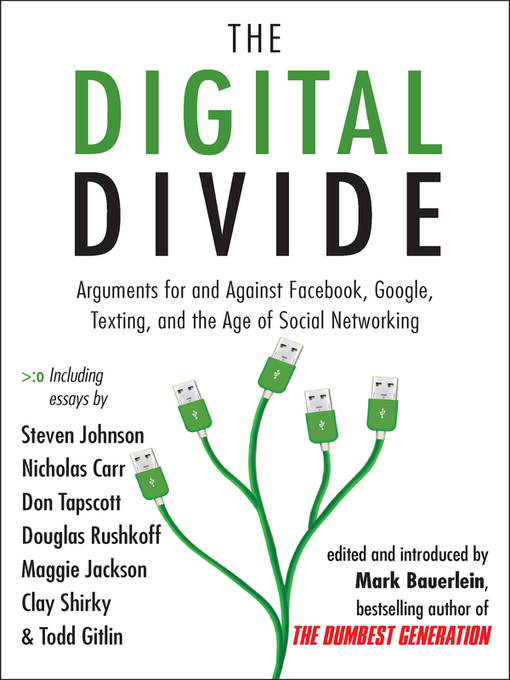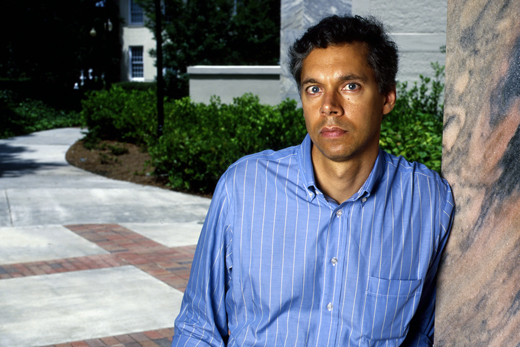Bauerlein in 2011 | |
| Born | 1959 |
|---|---|
| Alma mater | University of California, Los Angeles |
| Occupation | Academic |
| Employer | Emory University |
Mark Bauerlein
Mark Weightman Bauerlein is an English professor at Emory University and senior editor of First Things journal. He serves, in addition, as a Visitor of Ralston College, a start-up liberal arts college in Savannah. You can Read Online The Dumbest Generation here in PDF, EPUB, Mobi or Docx formats. The Dumbest Generation Author: Mark Bauerlein. The Dumbest Generation Mark Bauerlein Pdf Download. My name is Martin and I am a born an bred Aussie guy who loves personal finance, blogging and helping others achieve financial. They also make 2. They play games on the device as well, and browse the Web, take pictures and log hours of social networking.
Mark Weightman Bauerlein (born 1959) is an English professor at Emory University and senior editor of First Things journal.[1] He serves, in addition, as a visitor of Ralston College, a start-up liberal arts college in Savannah.[2]
Early life and education[edit]
The Dumbest Generation Mark

Bauerlein earned his doctorate in English from UCLA in 1988, having completed a thesis on poet Walt Whitman under the supervision of Joseph N. Riddel.[3]
Career[edit]
Bauerlein has taught at Emory University since 1989. Between 2003 and 2005, he worked at the National Endowment for the Arts, serving as the director of the Office of Research and Analysis.[4][5] While there, Bauerlein contributed to an NEA study, 'Reading at Risk: A Survey of Literary Reading in America'.[6]
Work[edit]
Bauerlein's books include Literary Criticism: An Autopsy (1997) and The Pragmatic Mind: Explorations in the Psychology of Belief (1997). He is also the author of the 2008 book The Dumbest Generation: How the Digital Age Stupefies Young Americans and Jeopardizes Our Future (Or, Don't Trust Anyone Under 30),[7][8] which won the Nautilus Book Award.
Bauerlein explains how his experience as a teacher led to his writing of The Dumbest Generation:
Because in my limited experience as a teacher, I’ve noticed in the last 10 years that students are no less intelligent, no less ambitious but there are two big differences: Reading habits have slipped, along with general knowledge. You can quote me on this: You guys don’t know anything.[9]
Apart from his scholarly work, he publishes in popular periodicals such as Chronicle of Higher Education, The Washington Post, The Wall Street Journal, The Weekly Standard and The Times Literary Supplement.[3]
Personal life[edit]
In 2012, Bauerlein announced his conversion to Catholicism.[10] He has self-described himself as an 'educational conservative', while he socially and politically identifies as being 'pretty liberal and libertarian', according to an interview conducted by Reason magazine.[11] He endorsed Donald Trump in the 2016 U.S. presidential election.[12] Bauerlein has an identical twin brother.[10]
List of works[edit]
- Bauerlein, Mark (1991), Whitman and the American Idiom, Louisiana State University Press.
- ——— (1997), Literary Criticism, An Autopsy, University of Pennsylvania Press.
- ——— (1997), Pragmatic Mind: Explorations in the Psychology of Belief, Duke University Press.
- ——— (2001), Negrophobia: A Race Riot in Atlanta, 1906, Encounter Books.
- ——— (2008), The Dumbest Generation: How the Digital Age Stupefies Young Americans and Jeopardizes Our Future (Or, Don't Trust Anyone Under 30), New York, NY, USA: Jeremy P. Tarcher/Penguin
See also[edit]
References[edit]
- ^'Featured Authors'.
- ^'About Ralston College'. Ralston College. Retrieved 9 August 2013.
- ^ ab'Mark Bauerlein, Professor'. english.emory.edu.
- ^'Bauerlein', Faculty, Emory.
- ^Biography (online ed.), National Review, archived from the original on February 23, 2009, retrieved April 26, 2010
- ^Reading at Risk(PDF), NEA, archived from the original(PDF) on 2008-04-20.
- ^Bauerlein 2008.
- ^Catalog record for The Dumbest Generation at the United States Library of Congress
- ^Betts, Eric (29 February 2008), 'Are We The Dumbest Generation?', The Emory Wheel.
- ^ abBauerlein, Mark (May 2012) My failed atheism, First Things Journal Retrieved October 23, 2014
- ^Hayes, Dan (21 July 2008). 'Mark Bauerlein: Why Young Americans Are the Dumbest Generation'. Reason. Retrieved 9 August 2013.
- ^'Scholars and Writers for America'. scholarsandwritersforamerica.org. Retrieved October 1, 2016.
External links[edit]

| Wikimedia Commons has media related to Mark Bauerlein. |
- 'Bauerlein', Faculty, Emory, archived from the original on 2009-12-08.
- 'Transcript of a conversation with readers', The Boston Globe, May 14, 2008.
- Bauerlein, Mark (2005–2006). 'Posts'. The Valve, A Literary Organ.
- A film clip The Open Mind — 'The Dumbest Generation' (2008) is available at the Internet Archive
- Bauerlein, Mark; Feldman, David (Sep 28, 2008), debate with a recent Emory Goizueta Business School Graduate, CNN.
ISBN : 9781440636899
Genre : Social Science
File Size : 36.63 MB
Format : PDF, ePub, Docs
Download : 342
Read : 768